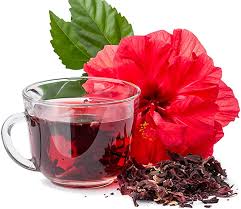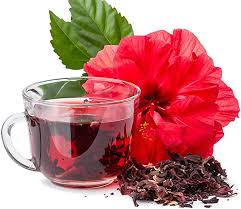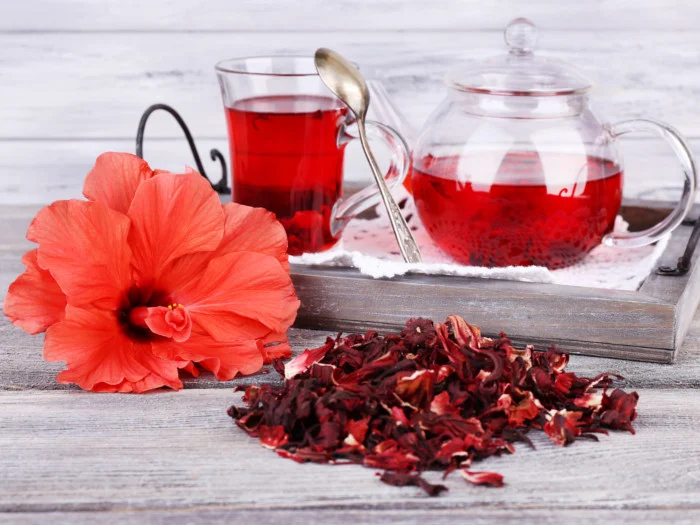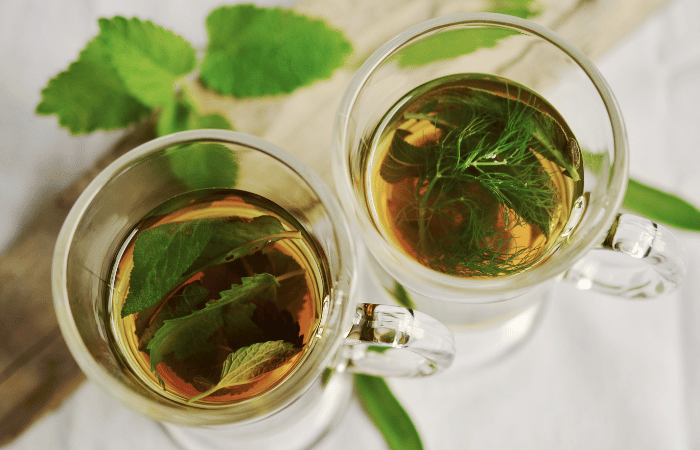Benefits Of Hibiscus Flower!

Hibiscus tea is a herbal tea made as an infusion from crimson or deep magenta-colored calyces (sepals) of the roselle (Hibiscus sabdariffa) flower. It is consumed both hot and cold. It has a tart, cranberry-like flavor.
Africa
The roselle hibiscus used to make the tea likely originated in Africa.[In Africa, hibiscus tea is commonly sold in markets and the dried flowers can be found throughout West and East Africa. Variations on the drink are popular in West Africa and parts of Central Africa. In Senegal, bissap is known as the “national drink of Senegal”. Hibiscus tea is often flavored with mint or ginger in West Africa. In Ghana it is known as “sobolo”, and “zobo” in Nigeria.
Karkadé is served hot or chilled with ice. It is consumed in some parts of North Africa, especially in Egypt and S udan.]In Egypt and Sudan, wedding celebrations are traditionally toasted with a glass of hibiscus tea. On a typical street in central Cairo, many vendors and open-air cafés sell the drink.
Health benefits of hibiscus tea
So, what exactly is the power of hibiscus? Czerwony explains some of its health benefits.
1. Protects with antioxidants
The hibiscus plant is rich in antioxidants such as beta-carotene, vitamin C and anthocyanin. “Antioxidant-rich foods really help across the board with quite a few health conditions,” Czerwony says.
Antioxidants destroy harmful molecules known as free radicals within your body. Free radicals cause damage to cells that contribute to diseases such as cancer, heart disease and diabetes. While your body uses its own antioxidants to fight free radical damage, antioxidant-rich foods may also play a role in preventing disease.
2. Fights inflammation
Several animal studies and a few small human studies have shown hibiscus’s ability to fight inflammation, Czerwony says.
Inflammation plays a role in the development of many illnesses, including cancer, asthma, Alzheimer’s disease, heart disease and rheumatoid arthritis. While more research is needed, it seems that hibiscus may offer helpful anti-inflammatory effects.
3. Lowers blood pressure
High blood pressure affects nearly half of all adults in the U.S., leading to serious health problems like heart attack, stroke, heart failure and kidney disease. In clinical trials, drinking hibiscus tea has been shown to lower blood pressure in humans.
However, the National Center for Complementary and Integrative Health points out that hibiscus and other herbal remedies only slightly lower blood pressure. They can’t replace medications for those who’ve been diagnosed with high blood pressure.
4. Lowers cholesterol
High cholesterol is another health problem that affects millions of adults and contributes to serious diseases like heart attack and stroke. While some clinical studies have shown hibiscus lowers cholesterol levels, others have shown little effect.
Czerwony says hibiscus may help maintain healthy cholesterol levels, but once again, we need more research to be sure.
5. Promotes weight loss
Several studies show a positive impact on weight loss, which could help prevent obesity — but these studies used hibiscus extract, a more concentrated form than hibiscus tea. Czerwony notes that we don’t yet know whether hibiscus tea produces the same result.
6. Fights bacteria
In laboratory studies, hibiscus extract kept certain types of bacteria in check. While it’s clear hibiscus has antibacterial properties, researchers are studying its effectiveness in people.
7. Supports liver health
Hibiscus helps keep the liver healthy, according to several studies. The extract protects the liver from a variety of toxins, likely due to its powerful antioxidant activity. It’s even demonstrated some anti-cancer activity in laboratory tests of liver cells.
Product Enquiry: https://amakafoods.com/product/dried-hibiscus-flower/






